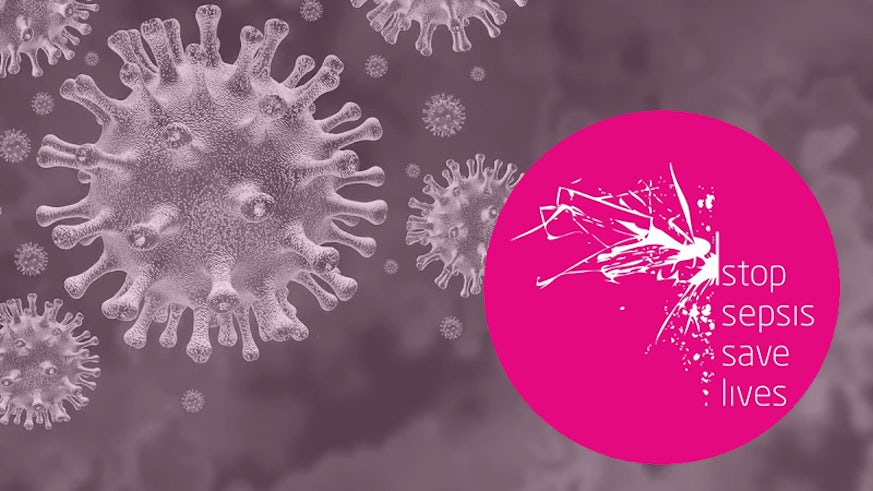Project Sepsis to shine a spotlight on links between COVID-19 and sepsis for World Sepsis Day
3 September 2020

A Cardiff University research project is bringing together clinicians, patients and scientists for a collaborative online event showcasing the links between the COVID 19 pandemic and sepsis.
The event, which will be held on 14 September to mark World Sepsis Day, will explore the similarities and clinical links between the two conditions, and the way in which COVID-19 and the immune system can inflict serious harm.
Sepsis is a life-threatening condition that is triggered by an infection of any kind, bacterial, viral or fungal and, can affect anybody at any age. However, it is more common in vulnerable populations such as the very old. It is a condition that is extremely difficult to diagnose as initial symptoms can be very subtle. If left untreated, it can cause loss of life within hours.
According to preliminary research, patients who have had severe COVID-19 are potentially at risk for developing viral sepsis from the corona virus infection and for those surviving intensive care showing a higher vulnerability to developing sepsis from subsequent infections.
The online webinar will weave together narratives from experts across various fields who have been investigating how the two conditions are linked, from intensive care to clinical research.
Among the speakers on the day will be Dr Matt Morgan, ICU consultant at the University Hospital of Wales and an Honorary Senior Research Fellow at Cardiff University School of Medicine. Dr Morgan has first-hand experience of the fight against COVID-19 in Wales, and will be sharing excerpts from his experiences of the past 6 months as well as examining the links between sepsis and COVID-19.
Joining Dr Morgan are Project Sepsis team members, Dr. Fergus Hamilton, a clinical microbiologist working in the frontline diagnostics of infection and in partnership with Prof Peter Ghazal aims to investigate the genetics of an adverse response to infection, together with Dr Luke Cynlais Davies, an internationally recognised Welsh research scientist specialising in the function of front-line immune cells in sepsis.
Finally, the webinar will feature first-hand experience of COVID-19 from patient Davide, a 37-year-old father of one from Cardiff who recovered from very severe COVID-19 earlier this year after receiving life-saving treatment under the care of Dr Morgan.
Following the video discussion from the panellists, there will be the opportunity to ask questions around the link between sepsis and COVID-19, and to explore what opportunities there are for research and treatments based on new information about both conditions.
The webinar will be open to interested research and clinical parties, as well as members of the public and the press, to mark World Sepsis Day which is officially held globally on 13 September.
About Project Sepsis
Project sepsis is a research collaboration across medicine and science disciplines that addresses an urgent medical need for recognising and accurately detecting infection underlying sepsis. It uses computer-assisted genome, proteome, and metabolism approaches to decode the communication from the blood-immune system to more rapidly detect infection and identify innovative treatments.
Speaking last week about the next steps for Project Sepsis, Professor Peter Ghazal said:
“The research and work we’ve carried out over the last sixteen years and which has been done studying hundreds of patients, has been a proof of concept for accurately predicting, by using just a finger-prick of blood, whether an infection will to lead to bacterial sepsis. What we need to do now is to move this work into clinical validation and to also find out if we can predict viral sepsis using our method as a diagnostic test and to determine whether it would dramatically improve the outcomes of patients."

"Our approach is to work with the wider community and to facilitate as fast as possible any potential test that can be introduced into a clinical setting. We’re very excited and think this could be achieved within five years."
"The current test for bacterial sepsis takes days and in 85% of cases, fails. There are none currently for viral sepsis. What we are proposing as a test could take minutes – it could therefore add a really important tool in the armoury of physicians to enable them to identify and discriminate between viral and bacterial sepsis, to make the right decisions and to give the right medication to patients.
Project Sepsis is a community in action. It involves many disciplines within medicine, within science and the whole community. Really important to our work is our lay advisory group which has been fully involved and has been shaping the way in which we will move forward in the future.”